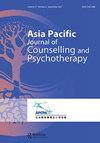Being yourself: An assessment of authenticity in undergraduates of a University in Sri Lanka
IF 0.5
4区 心理学
Q4 PSYCHOLOGY, CLINICAL
Asia Pacific Journal of Counselling and Psychotherapy
Pub Date : 2021-05-11
DOI:10.1080/21507686.2021.1924810
引用次数: 0
Abstract
ABSTRACT Authenticity is an indicator of psychological well-being. Until recently, studies on this construct has been scarce. This study aimed to fill this gap by culturally adapting a Sinhala version of the Authenticity Scale and using it to examine authenticity and selected demographic correlates among Sri Lankan undergraduates. The Sinhala version of the Authenticity Scale showed favourable psychometric properties. The survey results on 1235 Sri Lankan undergraduates indicate that this group is comparable to their counterparts in some dimensions of authenticity. The results also indicate that women report higher authenticity than men. Implications of this study are discussed, whilst emphasising the need to take into account variations that may occur in relation to authenticity in demographic factors such as gender.做你自己:斯里兰卡一所大学本科生真实性评估
真实性是心理健康的一个指标。直到最近,关于这种结构的研究还很少。本研究旨在填补这一空白,通过文化适应僧伽罗版本的真实性量表,并使用它来检查真实性和选定的人口统计学相关性在斯里兰卡的本科生。僧伽罗语版本的真实性量表显示出良好的心理测量特性。对1235名斯里兰卡大学生的调查结果表明,这一群体在真实性的某些维度上与其他群体相当。结果还表明,女性比男性更真实。本文讨论了本研究的意义,同时强调需要考虑到性别等人口因素中可能出现的与真实性相关的变化。
本文章由计算机程序翻译,如有差异,请以英文原文为准。
求助全文
约1分钟内获得全文
求助全文

 求助内容:
求助内容: 应助结果提醒方式:
应助结果提醒方式:


